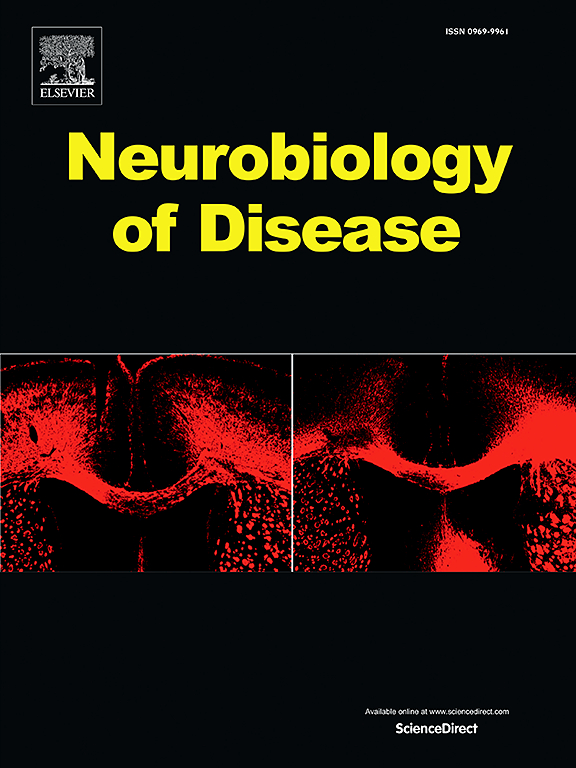Inhibition of PTPRS function does not affect the survival or regeneration of dopaminergic neurons but alters synaptic function in the nigrostriatal pathway
IF 5.1
2区 医学
Q1 NEUROSCIENCES
引用次数: 0
Abstract
Parkinson's Disease (PD) is characterized by midbrain dopaminergic (mDA) neuron degeneration in the ventral midbrain, contributing to debilitating motor symptoms. This study investigated whether Protein Tyrosine Phosphatase Receptor Sigma (PTPRS), a known inhibitor of axonal growth through chondroitin sulfate proteoglycan (CSPG) interaction, plays a role in mDA neuron survival, function, and regeneration in PD. Our data show that inhibition of PTPRS using intracellular sigma peptide (ISP) enhances human mDA neuron neurite outgrowth in vitro, suggesting an inhibitory role of this receptor in the differentiation of human embryonic stem cell (hESC)-derived mDA neurons in vitro. However, genetic deletion and pharmacological inhibition of PTPRS does not affect mDA neuron survival, axon density, or motor behavior in 6-OHDA unilateral partially lesioned mice. Similarly, mDA-specific deletion of Ptprs does not affect the basal behavioral measurement in cKO mice, including general locomotion and motor learning. Interestingly, however, Ptprs deletion led to a reduced response in the behavior sensitization to repeated methamphetamine (METH) exposure in cKO mice, suggesting a dampened response in synaptic function in cKO mice under these conditions. Ex vivo voltammetry recording in the striatum indeed shows altered parameters of dopamine (DA) release upon stimulation. These findings indicate that the inhibition of PTPRS function in human mDA neuron progenitors might be a promising strategy for enhancing neurite outgrowth or incorporation in host tissues in transplantation therapies. Finally, our data support that inhibition of PTPRS function in mDA neurons in adult mice in vivo could inhibit METH induced plasticity and behavioral sensitization.
抑制PTPRS功能不影响多巴胺能神经元的存活或再生,但会改变黑质纹状体通路的突触功能
帕金森病(PD)以中脑腹侧多巴胺能(mDA)神经元变性为特征,导致衰弱的运动症状。本研究探讨了蛋白酪氨酸磷酸酶受体Sigma (PTPRS)是否在PD中mDA神经元的存活、功能和再生中发挥作用,PTPRS是一种已知的通过硫酸软骨素蛋白聚糖(CSPG)相互作用抑制轴突生长的抑制剂。我们的数据表明,利用细胞内西格玛肽(ISP)抑制PTPRS可以促进体外培养的人mDA神经元的生长,这表明该受体在体外培养的人胚胎干细胞(hESC)来源的mDA神经元的分化中起抑制作用。然而,PTPRS的基因缺失和药理抑制并不影响6-OHDA单侧部分损伤小鼠的mDA神经元存活、轴突密度或运动行为。同样,mda特异性的Ptprs缺失并不影响cKO小鼠的基本行为测量,包括一般运动和运动学习。然而,有趣的是,Ptprs缺失导致cKO小鼠对反复暴露于甲基苯丙胺(METH)的行为敏化反应降低,这表明在这些条件下cKO小鼠的突触功能反应受到抑制。纹状体的离体伏安记录确实显示刺激后多巴胺(DA)释放参数的改变。这些发现表明,在移植治疗中,抑制人mDA神经元祖细胞的PTPRS功能可能是促进神经突生长或融入宿主组织的一种有希望的策略。最后,我们的数据支持在体内抑制成年小鼠mDA神经元的PTPRS功能可以抑制甲基安非他明诱导的可塑性和行为致敏。
本文章由计算机程序翻译,如有差异,请以英文原文为准。
求助全文
约1分钟内获得全文
求助全文
来源期刊

Neurobiology of Disease
医学-神经科学
CiteScore
11.20
自引率
3.30%
发文量
270
审稿时长
76 days
期刊介绍:
Neurobiology of Disease is a major international journal at the interface between basic and clinical neuroscience. The journal provides a forum for the publication of top quality research papers on: molecular and cellular definitions of disease mechanisms, the neural systems and underpinning behavioral disorders, the genetics of inherited neurological and psychiatric diseases, nervous system aging, and findings relevant to the development of new therapies.
 求助内容:
求助内容: 应助结果提醒方式:
应助结果提醒方式:


